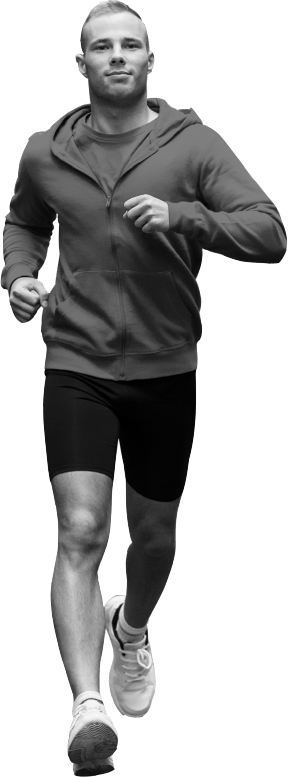What is Posterior Cruciate Ligament (PCL) Injury?
The Posterior Cruciate Ligament (PCL) stands as a critical stabilising structure within the knee joint, responsible for resisting excessive posterior rotational instability of the tibia (Shin bone) concerning the femur (thigh bone). The PCL is larger and stronger than the Anterior Cruciate Ligament (ACL) and requires a more unlikely position in order for it to become compromised, making PCL injuries less common than ACL injuries.
The mechanism of PCL injury typically involves a forceful anterior trauma to the knee, where the joint is subjected to sudden hyperflexion, surpassing its physiological limits. This hyperflexion places undue stress on the PCL, leading to partial or complete rupture of the ligament. Unlike ACL injuries, which commonly occur during activities involving sudden stops, changes in direction, or landing from jumps, PCL injuries often result from direct blows to the front of the knee, such as those experienced in motor vehicle accidents, falls onto flexed knees, or sports-related collisions.
Damage to the PCL is rarely an isolated event; it often entails concurrent injuries to surrounding structures within the knee joint, including the menisci, collateral ligaments, and articular cartilage. Consequently, patients with PCL injuries may present with acute onset of knee pain following the traumatic event, accompanied by a modest degree of swelling due to rupture of the joint capsule. However, significant swelling may not be as prominent as in ACL injuries, owing to the PCL’s deeper location within the knee joint.
A well-known sign of PCL injury is the development of discoloration or bruising on the posterior aspect of the calf several days following the incident. This discoloration, known as “posterior knee pain syndrome,” arises from the extravasation of blood into the soft tissues surrounding the PCL, indicative of significant trauma to the ligament.
If you are suffering from Posterior Cruciate Ligament (PCL) Injury, we have a team who is ready to help you and get you on the road to recovery. Book an appointment with Precision Health today!
Call us on (02) 9639 7337 or book online.
Book Now With Precision Health today and take the first step towards better health!
Book NowConditions Treated
Take care of your health with precision!
Precision Health Spine & Sports clinic treats a diverse range of neuromuscular and skeletal biomechanical disorders. Whether you are having trouble with your knees, you have a pain in the neck, or if you are just feeling stiff and sore, we can help you with our suite of treatment options that can be tailored especially for you. Take a look at the wide range of disorders we can help you with. Whether you need chiropractic treatment, remedial massage, physiotherapy, podiatry or a combination of disciplines, we have the expertise to decrease your pain and discomfort and increase your mobility and quality of life.
Headaches & Migraines
Shoulder Pain
Elbow Pain
- Ulnar Collateral Ligament Sprain/Strain
- Radial Head Subluxation (Nursemaid’s Elbow)
- Radial Collateral Ligament Sprain/Strain
- Posterior Impingement Syndrome
- Osteochondrosis (Panner’s Disease)
- Olecranon Bursitis (Miner's Elbow)
- Medial Epicondylitis (Golfer's Elbow)
- Little League Elbow Syndrome
- Lateral Epicondylitis (Tennis Elbow)
- Joint Hypermobility Syndrome
- Elbow Joint Dysfunction
Finger and Thumb Pain
Wrist Pain
- Wrist Tendinopathy
- Wrist Ganglions
- Ulnar Tunnel Syndrome (Guyon’s Canal Syndrome)
- Triquetrolunate Dissociation
- Triquetrohamate Instability
- Triangular Fibrocartilage Complex Injury
- Superficial Radial Nerve Compression: Causes and Symptoms
- Scapholunate Dissociation
- Scaphoid Fracture
- Radial Tunnel Syndrome
- Pronator Teres Syndrome
- Posterior Interosseous Nerve Syndrome (PINS)
- Kienbock’s Disease
- Intersection Syndrome
- Hook of Hamate Fracture
- Dorsal Impaction Syndrome
- De Quervain’s Tenosynovitis
- Cubital Tunnel Syndrome
- Carpal Tunnel Syndrome
- Anterior Interosseous Syndrome
Knee Pain
- Tibial Plateau Fractures
- Tennis Leg
- Proximal Tibial-Fibular Subluxation/Dysfunction
- Posterior Cruciate Ligament (PCL) Injury
- Popliteus Tendinitis
- Pes Anserine Bursitis/Tendinitis
- Patellofemoral Pain Syndrome (Runner’s Knee)
- Patellofemoral Arthralgia (Chondromalacia Patellae)
- Patellar Tendinitis (Jumper’s Knee)
- Patellar Dislocation and Subluxation
- Osteochondritis Dissecans (OCD) of the Knee Joint
- Osteoarthritis of the Knee Joint
- Osgood-Schlatter Disease
- Meniscus Injuries to the Knee
- Medial Collateral Ligament (MCL) Injury
- Lateral Collateral Ligament (LCL) Injury
- Knee Joint Dysfunction
- Iliotibial Band Syndrome
- Anterior Cruciate Ligament (ACL) Injury
Head And Neck Pain
- Whiplash Injury (Hyperflexion/Hyperextension Injury)
- Torticollis (Wry Neck)
- Thoracic Outlet Syndrome
- Temporomandibular Joint Dysfunction (TMJ Disorder)
- Herniated Cervical Disc
- Cervical Spondylosis
- Cervical Spine Sprain/Strain
- Cervical Segmental Joint Dysfunction
- Cervical Radiculopathy
- Cervical Facet Syndrome
Back Pain
- Transient-Structural Scoliosis (Sciatic Scoliosis)
- Thoracic Segmental Joint Dysfunction
- T4 Syndrome (Upper Thoracic Syndrome)
- Structural Scoliosis (Idiopathic Scoliosis)
- Shingles (Herpes Zoster Virus)
- Scheuermann’s Disease
- Non-Structural Scoliosis (Postural Scoliosis)
- Kyphosis
- Juvenile Scoliosis
- Infantile Scoliosis
- Compression Fracture
- Adult Scoliosis
Lower Back Pain
- Spondylolisthesis
- Sacroiliac Joint Dysfunction
- Sacroiliac Injury
- Reactive Arthritis (Reiter’s Syndrome)
- Mechanical Low Back Pain
- Lumbosacral Injury
- Lumbar Spondylolysis
- Lumbar Spinal Stenosis (Lumbar Canal Stenosis)
- Lumbar Segmental Joint Dysfunction
- Lumbar Facet Syndrome
- Lumbar Disc Herniation
- Ankylosing Spondylitis
- Abdominal Aortic Aneurysm
Hip, Groin and Thigh Pain
- Trochanteric Pain Syndrome
- Trochanteric Bursitis
- Traumatic Hip Dislocations
- Transient Synovitis
- Stress Fractures (Neck of Femur Fracture)
- Snapping Hip Syndrome
- Slipped Capital Epiphysis (Adolescent Coxa Vara)
- Rheumatoid Arthritis of the Hip Joint
- Quadriceps Muscle Strain/Quadriceps Muscle Tear
- Paget’s Disease
- Osteoarthritis of the Hip Joint
- Osteitis Pubis
- Muscle Contusions/Myositis Ossificans
- Meralgia Paresthetica
- Leg-Calve-Perthe’s Disease (Avascular Necrosis of the Hip)
- Ischial Bursitis
- Iliopectineal Bursitis and Iliopsoas Bursitis
- Hip Fractures
- Hamstring Muscle Injury
- Femoroacetabular Impingement
- Congenital Hip Dislocation (Congenital Hip Dysplasia)
- Adductor Muscle Injury
- Acetabular Labrum Tears





















